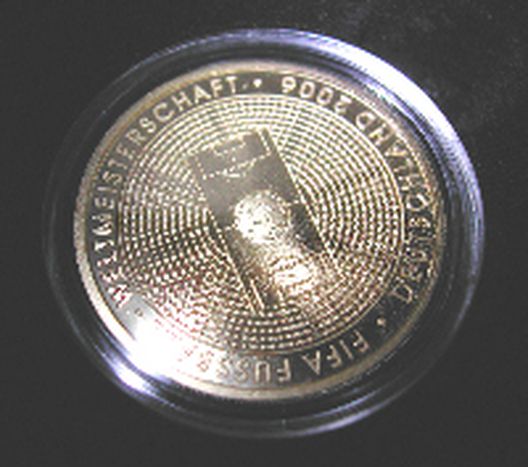
Scandals United
Published on
Translation by:
 maximillian conrad
maximillian conrad
For the last two years, football fans have been starting to question the beautiful game, as scandal after scandal has rocked European football. Yet solutions are still being sought at a national level
It all started in Café King, Berlin. Here, Robert Hoyzer used to come to enjoy coffee and cake. But, as all of Germany was to find out in early 2005, this is not all he did. It was in this small café that the then 25 year old Bundesliga referee would receive large amounts of money from Croatian gambling addict Ante Sapina. In return, Hoyzer would fix matches through making deliberate misjudgements. For Hoyzer, the collaboration meant a lot of money for a short time. For the German Football Association, it meant one of the biggest scandals in its 100 year history.
Three years behind bars
On November 17, 2005, Hoyzer and five other defendants were sentenced to jail by a regional court in Berlin. Their sentence far exceeded what had been demanded by the prosecution. Hoyzer and Ante Sapina are spending two and a half years and three years behind bars, respectively. The ruling is meant to deter other potential perpetrators. Hoyzer was convicted for the manipulation of football games in six cases. For example, in a German cup match between SC Paderborn 07 and Hamburger SV, he had helped Paderborn to an upset victory simply by ejecting Hamburg players, affecting the outcome of the whole Bundesliga season.
Things do not look any better South of the Alps. In May 2006, the Italian football association FIGC and numerous clubs have come under attack after phone records of conversations between Juventus General Manager Luciano Moggi and high-ranking FIGC officials revealed manipulation and bribery in 19 cases. Torino-based Juventus is now facing the potential revocation of their last national championship as well as relegation to the second division.
A bottomless pit
Since the investigations started, the corruption case is growing ever larger. Recently, the resignation of Juventus’ entire board was followed by that of Aldo Biscardi, until then host of the popular football show Il Processo. He had been accused of polishing up Juventus’ reputation. Investigations are also underway against Alessandro Moggi, son of Luciano Moggi and head of the biggest Italian football agency, GEA World.
GEA World is said to have threatened players with the use of force to get them to sign contracts. Davide Lippi, son of national team coach Marcello Lippi and former GEA World employee, is also suspected of bribery. Yet the corruption affair does not only involve officials, but extends also to players. Two members of the national team were interrogated for their contacts to GEA World: goalkeeper Gianluigi Buffon and team captain Fabio Cannavaro.
The Italians are not surprised by the scandal. “Corruption quite simply is not confined to football, it occurs throughout the country, at all levels,” says Flavia, a 25-year-old translator from Rome who despite the recent scandals remains a faithful Juventus supporter. In the US, scandals are called -gate. In Italy, scandals are referred to as -opoli. The media are already talking about Calciopoli, alluding to the bribery scandal known as Tangentopoli that swept Italy’s entire political class off the stage in the early 90’s. There are many who share the opinion of Milan based Aerophysics PhD student Davide Rizzo, who believes that “we will soon have to cope with bankrupt teams, players moving abroad and fans trashing the streets.” Still he hopes that the expected reforms will “bring a breath of fresh air into Italian football.”
60 000 Euros and a TV set
Compared to the situation in Italy, the German scandal seems rather harmless. But even in Germany concerns are being raised about the transformation of football. “Particularly at a high level, the financial aspect is taking centre stage,” says Cologne-based student Judith Köhler, 26. “I am not surprised that the boundaries between legal, semi-legal and illegal are blurring.” Robert Hoyzer received a total of about 60 000 Euros and a plasma TV for his efforts. The damage to German football, on the other hand, runs into millions. And Juventus has lost not only the fondness of its supporters, but also 40 percent of its stock market value.
Scandals in the football business are a European-wide problem. In May 2004, a corruption affair involving numerous referees and officials was uncovered in the Czech Republic, where games had also been fixed for bribes. As a consequence, attendance numbers at games in the Czech League dropped to around 5000 on average. This past February, it was revealed that the Chinese mafia has been heavily involved in manipulating games in Belgium, putting 50 players under suspicion.
A European problem – national solutions
So far, measures are only being taken at the national level. The German Football Association DFB, in its role as host of the 2006 World Cup, has been keen to solve the issue quickly. In Germany, referees can now be switched even on game day. The DFB has also introduced a ban on gambling for all players, coaches, officials and referees.
“National football scandals such as the Italian one are outside the scope of EU decision making,” says Borja Garcia, a PhD student at Loughborough University writing a dissertation on sports and the EU. Competence in those areas clearly resides with the national associations and governments, as there has not been any uniform EU legislation to date. “It would be an option to give the EU a legal framework for regulating high-level sports,” says Garcia, only to add immediately: “But there is no political will to do so at present.”
Translated from In Skandalen vereint


